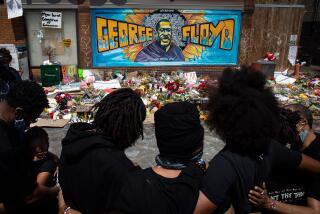Bush Illness, Kurds Top Public Interest : News: 55% in survey find media treatment of Quayle unfair. The economy was followed closely by 33%, Bangladesh cyclone by 23%.
- Share via
WASHINGTON — George Bush’s heart condition and the plight of Iraq’s Kurdish refugees were the news events Americans followed most closely during the last month, according to a new survey, although no single story focused public attention to any significant degree.
Fifty-five percent of those surveyed said that they thought coverage of the qualifications of Vice President Dan Quayle in the wake of the President’s health problems was unfair. And, in another disapproving note, 45% said they thought there was too much coverage of the rape allegations involving William Kennedy Smith, the monthly Times Mirror News Interest Index found.
The monthly survey, in which 1,206 adults were interviewed between May 16 and 19, measures public response to the news. The results have a margin of error of plus or minus 3 percentage points. Errors can also be introduced by the wording and nature of the questions.
Just 38% of the survey participants said that they had followed very closely reports of President Bush’s weekend hospitalization for treatment of an erratic heartbeat caused by a previously undiagnosed thyroid problem.
Roughly the same number, 36%, said they were very closely following news about efforts to aid and protect Kurdish refugees in northern Iraq. That is only about half the level of public interest that was directed at the Persian Gulf military buildup and war effort.
News about the economy was very closely watched by 33% of Americans, making it the third most closely followed story of the month.
On an issue raised by Bush’s hospitalization, 26% of those surveyed said they were very closely following coverage of renewed public interest in Quayle’s qualifications to assume the presidency.
Although 55% said they thought the vice president was being treated unfairly by the press, 33% thought the coverage was fair. The findings are comparable to public perceptions of press coverage of Quayle during the 1988 campaign.
An unexpectedly large number of participants, 24%, said they were very closely following reports of White House Chief of Staff John H. Sununu’s use of military aircraft for personal and political travel.
By comparison, only 15% of the public closely followed the conflict-of-interest allegations involving Atty. Gen. Edwin Meese III during the Ronald Reagan Administration, and only 12% paid close attention to the recent “Keating Five” case involving senators accused of doing favors for a major campaign contributor.
The cyclone in Bangladesh captured the very close attention of 23% of the public, according to the latest survey, and the rape allegations involving Smith, a member of Massachusetts’ Kennedy family, was very closely followed by 21% of respondents.
Nearly half of those surveyed, 45%, said they thought the case had received too much press coverage.
An overwhelming 70% said they disapproved of the release of the name of the woman who was allegedly raped, a lower figure than indicated in earlier polls. Only a few news organizations, including NBC News and the New York Times, have identified the woman by name. The New York Times was also criticized for the tone of a profile that some thought suggested that the alleged victim’s behavior might have invited an attack.
Similarly, the public seemed unconvinced that the press had any legitimate public policy motivation for identifying the woman. Only 9% thought that news organizations who used the name did so to help lift the stigma attached to rape victims.
Instead, 80% said they suspected that the news organizations that named the woman probably did so to boost circulation.
Still, the modest level in interest in the rape story was still greater than the level of interest in President Bush’s educational reform plan, which was very closely followed by just 14% of Americans.
Despite that low level of interest, respondents were able to correctly answer questions about details of the plan: 72% said they believe Bush favored requiring students to take national competency tests and 54% said the President supported a voucher plan allowing parents to select their children’s schools.
The Soviet Union also seems to be receding from the interest of Americans, according to the survey. Only 14% of participants said they were following Soviet news very closely, fewer than in mid-March.
And just 8% of Americans said that they were paying very close attention to the Kitty Kelley celebrity biography of former First Lady Nancy Reagan.
In the News
The Times Mirror News Interest Index measures public response to the news, reflecting calls to 1,206 adults nationwide between May 16-19. The most closely followed news stories: President’s heart condition: 38%
The plight of Iraq’s Kurds: 36%
The economy: 33%
Dan Quayle’s qualifications: 26%
John H. Sununu’s travels: 24%
Bangladesh cyclone: 23%
Charges against William Kennedy Smith: 21%
Bush’s education plan: 14%
Problems in the U.S.S.R.: 14%
Nancy Reagan’s biography: 8%
More to Read
Get the L.A. Times Politics newsletter
Deeply reported insights into legislation, politics and policy from Sacramento, Washington and beyond. In your inbox twice per week.
You may occasionally receive promotional content from the Los Angeles Times.









